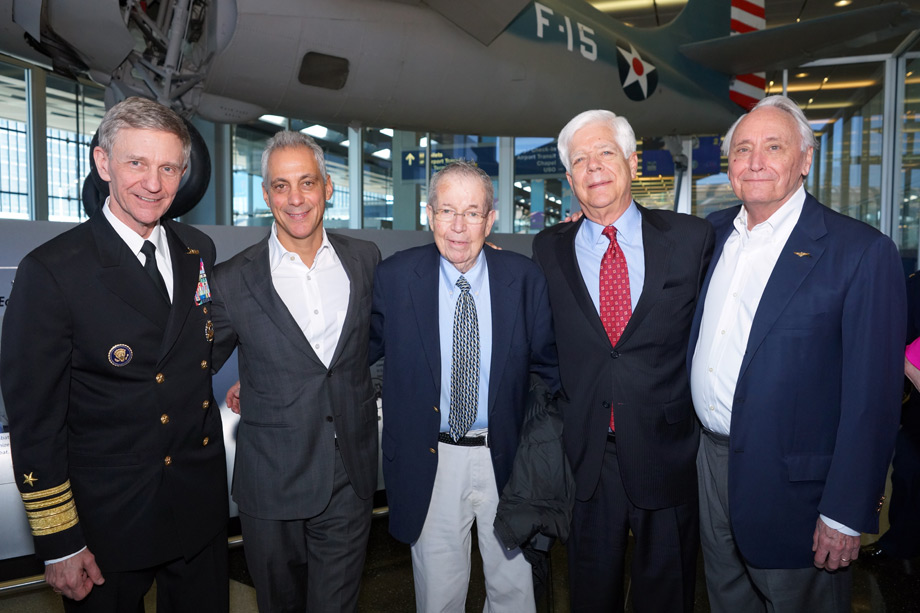Representatives from the U.S. Navy and the City of Chicago joined family members and well-wishers of the late Lt. Cmdr. Edward “Butch” O’Hare for a ceremony honoring the 75th anniversary O’Hare’s heroic actions during World War II here Feb. 17.
Vice Adm. Philip H. Cullom, deputy chief of naval operations for Fleet Readiness and Logistics, joined Chicago Mayor Rahm Emmanuel, 14th Ward Alderman Edward Burke, Aviation Commissioner Ginger Evans, along with 36 members of the O’Hare family at O’Hare International Airport to commemorate Butch O’Hare’s legendary achievement.
Additional Navy participants in the commemoration ceremony were Navy Chaplain Lt. Eric Bryan, the Navy Band, Great Lakes, Navy Junior ROTC cadets from Chicago’s Hyman G. Rickover Naval Academy, and sailors from Navy Operational Support Center, Chicago.
Standing in front of the Butch O’Hare exhibit in the airport’s Terminal Two, several speakers reflected on the significance of O’Hare’s legendary mission and most importantly why the public needs to remember the selfless deed of a humble and ordinary man of extraordinary character.
“That is why we are here today,” said Cullom. “To remember and never forget a man who demonstrated the qualities of courage and selflessness when his shipmates and nation needed him most. It was those collective qualities that made Butch O’Hare a hero—these are the qualities that made Butch O’Hare a legend.”
“Butch O’Hare’s remarkable story is one that our sailors, as well as the youth of our nation, need to learn, appreciate, and to be inspired by,” said Cullom.
The legend of O’Hare began on Feb. 20, 1942. On that date, O’Hare single-handedly took on nine Imperial Japanese bombers barreling inbound toward the USS Lexington. For various reasons O’Hare found himself alone and the only thing between the Japanese bombers and the Lexington.
As his Congressional Medal of Honor citation put it, “Without hesitation, alone and unaided, he repeatedly attacked this enemy formation, at close range in the face of intense combined machine gun and cannon fire ... one of the most daring, if not the most daring, single action in the history of combat aviation.”
While O’Hare’s skill as a pilot and marksman are indisputable. The event provided an opportunity for an audience of young people to hear testimony as to O’Hare’s exceptional character.
“We speak of qualities of courage,” said Alderman Burke. “We hear a great deal about valor and self-sacrifice. But still we must ask ourselves what kind of man summons the strength of character, fortitude, the inner resolve to fly into the most perilous of conditions.”
Burke continued, “Imagine knowing that death was almost a near certainty. Retreat was not an option for Butch O’Hare. He knew and understood that the lives of every sailor and officer aboard the USS Lexington that day were on the line. Butch and his tiny Grumman fighter, flying solo, were the last line of defense against a disaster of immeasurable magnitude. This, ladies and gentlemen, I submit was a truly remarkable man.”
Further testimony of O’Hare’s remarkable character came from Mayor Rahm Emmanuel.
“The thing that has struck me always about Butch O’Hare wasn’t that flight,” said Emmanuel. “The flight was significant because of what he single-handedly accomplished through an incredible act of courage—an incredible act of sacrifice—that saved the USS Lexington.”
“What impressed me most is that after his famous flight he was sent to work promoting support for the war effort—selling war bonds and inspiring enlistments. After a short while he felt the need and decided to get back in the fight for his country,” said Emmanuel.
Emmanuel continued, “And that to me speaks not just to the training, I don’t want to take anything from the Navy, not just the courage, but it speaks to the character of the man. That he thought more of himself. He thought more of his country. He thought that more was needed out of Butch O’Hare.”
At the conclusion of his remarks, Cullom noted, “Apart from his gallantry and intrepidity in aerial combat Lt. Cmdr. Edward Henry “Butch” O’Hare was known as a humble man who never sought recognition for his contributions.
“He most likely considered himself an ordinary person. But isn’t that the definition of a hero, an ordinary person accomplishing extra-ordinary things,” said Cullom.
In honor of his distinguished service the Navy named a destroyer, the USS O’Hare in honor of Butch, and in September of 1949 Chicago’s Orchard Field was renamed Chicago-O’Hare International Airport as a tribute to his heroism.
As a side note, O’Hare International Airport has been inextricably linked and synonymous with today’s U.S. Navy, because almost 100 percent of all enlisted personnel have passed through the airport on their way to the quarterdeck of the Navy—the Navy’s only Boot Camp at Naval Station, Great Lakes.
